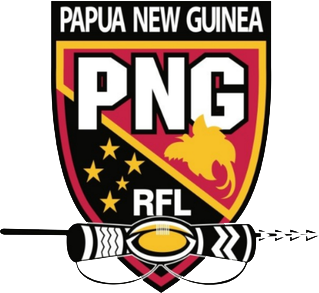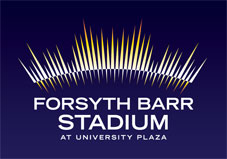
Lansdowne Road Stadium was a stadium in Dublin owned by the Irish Rugby Football Union (IRFU) that was primarily used for rugby union and association football matches. The stadium was demolished in 2007 to make way for the Aviva Stadium, which opened in 2010.

Canberra Stadium, known also as Bruce Stadium is a facility primarily used for rugby league, soccer and rugby union games, located adjacent to the Australian Institute of Sport in Canberra, the capital of Australia. The GIO Stadium Canberra is the largest sports venue by capacity in Canberra.

Lautoka is the second largest city in Fiji. It is on the west coast of the island of Viti Levu,in the Ba Province of the Western Division. Lying in the heart of Fiji's sugar cane-growing region, the city has come to be known as the Sugar City. Covering an area of 32 square kilometres, it had a population of 71,573 at the 2017 census, the most recent to date.

The Stade de France is the national stadium of France, located just north of Paris in the commune of Saint-Denis. Its seating capacity of 80,698 makes it the eighth-largest stadium in Europe. The stadium is used by the France national football team and French rugby union team for international competition. It is the largest in Europe for track and field events, seating 78,338 in that configuration. Despite that, the stadium's running track is mostly hidden under the football pitch. Originally built for the 1998 FIFA World Cup, the stadium's name was recommended by Michel Platini, head of the organising committee. On 12 July 1998, France defeated Brazil 3–0 in the 1998 FIFA World Cup Final contested at the stadium. It will host the opening and closing ceremonies and the athletics events at the 2024 Summer Olympics. It will also host matches for the 2023 Rugby World Cup.

Twickenham Stadium is a rugby union stadium in Twickenham, southwest London, England. Owned by the governing body of rugby union in England, the Rugby Football Union (RFU), the stadium hosts home test matches for the England national rugby union team. Other rugby union games played at the stadium include Middlesex Sevens matches, selected Premiership Rugby fixtures, selected Anglo-Welsh Cup matches, the Varsity Match between the universities of Oxford and Cambridge, and selected European Rugby Champions Cup matches. The RFU has its headquarters at the stadium.

The Papua New Guinea national rugby league team represents Papua New Guinea in the sport of rugby league football.

Wellington Regional Stadium is a major sporting venue in Wellington, New Zealand. The stadium's bowl site size is 48,000 m2.
Rugby league is a popular team sport in Papua New Guinea, and is the national sport. Papua New Guinea has a reputation for being the most passionate supporter of the game in the world.

Robina Stadium, also known by its sponsored name Cbus Super Stadium, is a rectangular football stadium in the Gold Coast suburb of Robina, Queensland. The main usage is as the home ground to the National Rugby League's Gold Coast Titans.

Stadio Renato Dall'Ara is a multi-purpose stadium in Bologna, Italy. It is currently used mostly for football matches and the home of Bologna F.C. 1909. The stadium was built in 1927 and holds 38,279. It has also been named Stadio Littoriale. It replaced the Stadio Sterlino. The stadium is named after Renato Dall'Ara, a former president of Bologna for thirty years.

Stadium de Toulouse is the largest multi-purpose stadium in Toulouse, France. It is currently used mostly for football matches, mainly those of the Toulouse Football Club and the big games of rugby for Stade Toulousain in the European Rugby Champions Cup or Top 14. It also hosts the test matches of France's national rugby union team. It is located on the island of Ramier near the centre of Toulouse. It is a pure football and rugby ground, and therefore has no athletics track surrounding the field. The stadium is able to hold 33,150 people.

FMG Stadium Waikato is a major sporting and cultural events venue in Hamilton, New Zealand, with a total capacity of 25,800. Four areas contribute to this capacity: The Brian Perry Stand holding 12,000, the WEL Networks Stand holding 8,000, the Goal Line Terrace holding 800 and the Greenzone can hold up to 5,000 people. The capacity can be extended, however, by temporarily adding 5,000 seats to the Goal Line Terrace area. The stadium, owned by the Hamilton City Council, regularly hosts two rugby union teams:
PNG Football Stadium is a sporting ground in Port Moresby, Papua New Guinea. It hosted 3 games for the 1989–1992 Rugby League World Cup. It has been the home ground for the Papua New Guinea national rugby league team since 1975. It has a total capacity of approximately 15,000 and is the National Stadium of Papua New Guinea. The stadium was completely redeveloped in preparation for the 2015 Pacific Games.
Carlaw Park was a multi-purpose stadium in Parnell, a central suburb of Auckland, New Zealand. It neighboured the Auckland Domain's Northern end. It was primarily used for rugby league and had a peak spectator capacity of around 28,000 in the 1930s, though this fell to around 17,000 by the time the ground was closed in 2002.
Prince Charles Park is a rugby union stadium in Nadi, Fiji. The stadium has a nominal capacity of 18,000 people.
The 2008 OFC Nations Cup was the eighth edition of the OFC Nations Cup, and the first under a new format that was introduced. It took place as a series of as a home-and-away round-robin tournament on FIFA match dates in 2007 and 2008. Doubling as the qualification tournament for the 2010 FIFA World Cup, the tournament was substantially different from earlier editions: 2004 champions Australia did not compete after leaving the Oceania Football Confederation for the Asian Football Confederation, and for the first time since the 1996 OFC Nations Cup, no fixed venue was used. Unlike the 2004 OFC Nations Cup, which had featured six teams from the Oceania Football Confederation, the 2008 tournament had just four teams.

The Forsyth Barr Stadium is a multi-purpose stadium in Dunedin, New Zealand. At various stages of development it was also known as Dunedin Stadium or Awatea Street Stadium, or its non-commercial official name during the 2011 Rugby World Cup and 2015 FIFA U-20 World Cup, Otago Stadium. It is also known colloquially as 'the glasshouse' due to its resemblance to a horticultural hothouse. The stadium was opened by New Zealand Prime Minister John Key on 5 August 2011, replacing Carisbrook as the home stadium of the Highlanders team in Super Rugby and the Otago Rugby Football Union team in the domestic Mitre 10 Cup. The stadium hosted four matches of the 2011 Rugby World Cup, and has hosted major music tours, starting in November 2011 with Elton John.
The 2009 Pacific Nations Cup is a rugby union tournament held between five national sides on the Pacific Rim: Fiji, Japan, Samoa, Tonga and the Junior All Blacks. The New Zealand Māori team that won the tournament last year will no longer take part in this competition because of a decision taken by the New Zealand Rugby Union. Australia A has also decided to pull out due to a similar decision. The inaugural competition was held in 2006. This year the tournament will begin on June 12 and ends on July 3, 2009 and most of the matches will be hosted by Fiji. The awarding of the key international tournament to the Fiji Rugby Union represents a further boost to the continued development of rugby in the region. The two opening round matches will be played outside of Fiji with Samoa hosting the Junior All Blacks in Apia and Tonga entertaining the Fijians in Nukuʻalofa the following day before the tournament moves to Fiji for a 17-day festival of international rugby spread across three match venues: the ANZ National Stadium (Suva), Churchill Park (Lautoka) and Lawaqa Park (Sigatoka).
The Pacific Rugby League International is a rugby league test match that has been played between two Pacific Island nations during the National Rugby League's annual representative weekend since 2013. The fixture was held at Penrith Stadium for the 2013 and 2014 test matches. In 2015, two fixtures were held; Samoa and Tonga competed for the Polynesian Cup while Fiji and Papua New Guinea competed for the Melanesian Cup at Cbus Super Stadium. In 2016 the fixtures returned to New South Wales and were held at Parramatta's Pirtek Stadium.
Oceania Rugby Women’s Championship is an international women's rugby union competition contested by women's national teams from Oceania.












